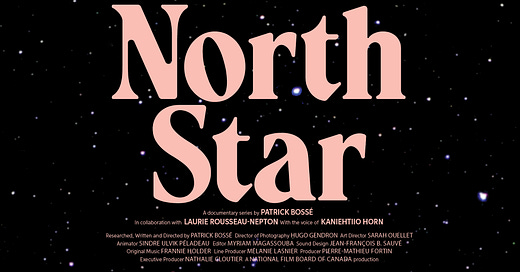North Star guides women on their journey to the stars
"When we inspire and encourage the coming generations of women scientists, in all their diversity, we ensure that they too will make amazing discoveries,” Astrophysicist Laurie Rousseau-Nipton.
Photo credit: The National Film Board of Canada
I highly recommend that on August 21st you gather all the young people you know to watch the National Film Board (NFB) premier of North Star.
The five-part documentary series is well worth 75 minutes of your time because it will amaze, excite, and even energize curiosity about the stars overhead and how their origins will help us understand the future.
This beautifully produced mini-series follows Laurie Rousseau-Nepton’s inspiring journey from her Innu roots in Quebec to project lead at the Canada-France-Hawaii Telescope (CFHT).
Working atop Mauna Kea, a dormant volcano on the island of Hawaii, Rousseau-Nepton is principle investigator for a multi-year project known as SIGNALS.
Rousseau-Nepton and her team of 60 international scientists are observing thousands of newly born stars in galaxies close to the Milky Way in order to understand how their birthplace affects the rest of their lives as well as the evolution of those galaxies.
The series beings with Rousseau-Nepton returning to the Ashuapmushuan Wildlife Reserve where as a child she honed her sense of wonder and observation.
While on a hunting trip with her father in Quebec’s Ashuapmushuan Wildlife Reserve, a young Rousseau-Nepton marvelled at shooting stars and the aurora borealis in the night sky.
Those early experiences of being on the land, combined with teachings of Ancestral Knowledge of astronomy, informed Rousseau-Nepton’s world view that draws from both Innu culture and her scientific knowledge.
Her work in Hawaii contributed an additional layer of Hawaiian ancestral Indigenous knowledge.
Rousseau-Nepton regards all of this as important for understanding where we’re headed because, “we have to realize that we are part of the universe and the universe is part of us.”
Rousseau-Nepton’s love of her field of work intrinsically extends beyond the observatory into the real world where she mentors young women entering the male-dominated field of astrophysics.
By demystifying what it means to aspire to a career in the sciences, and astronomy in particular, Rousseau-Nepton speaks honestly and optimistically about the place of women and people of diverse backgrounds in science, technology, engineering, and mathematics (STEM) professions. She is actively ushering in a new era and way of doing science.
The episodes seamlessly alternate between documentary sequences depicting Rousseau-Nepton’s life and work, and animated graphics illustrating scientific concepts.
“Science helps improve everyone’s knowledge. It’s also the best job in the world, if you ask me. And, doing it in collaboration, as opposed to in competition, is the ideal for me. When we inspire and encourage the coming generations of women scientists, in all their diversity, we ensure that they too will make amazing discoveries,” Rousseau-Nepton said.
The first Indigenous woman in Canada to obtain a Ph.D. in Astrophysics, Rousseau-Nepton is a recipient of National Science Foundation (NSF) and Fonds de recherche du Quebec Nature et technologies (FRQNT) grants for her research.
Rousseau-Nepton is also an assistant professor at the University of Toronto and the Dunlap Institute for Astronomy and Astrophysics.
The voice of this passionate scientist guides viewers through their exploration of the stars and the people who study them. The voice over for the English series was performed by actress Kaniehti:io Horn from Kahnawake, the Mohawk reserve outside of Montreal.
Montreal filmmaker and director Patrick Bossé created North Star to show that there is room in science for all kinds of people, regardless of gender, origin or culture.
“After all, the Universe evolved thanks to the intermixing of elements, from one generation of stars to the next. Science moves forward in the same way, with a plurality of perspectives,” Bossé shared.
North Star is available for free viewing starting August 21st on the NFB site.



